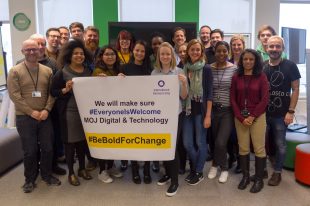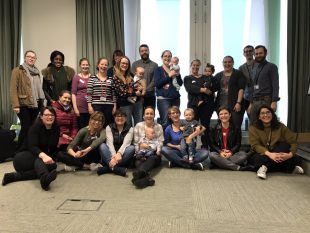I’d like to take the opportunity to explain why diversity matters so much for us at Justice Digital & Technology, and what we are doing to create a more inclusive team that better represents our users.
Why this matters
Talking about diversity and inclusion can feel a bit corporate; a box-ticking exercise that makes everyone feel good about themselves. But there is no excuse for our teams not to represent our societal demographics, especially in government.
At the Ministry of Justice, we provide services to the most vulnerable members of society, often during the most stressful moments in their lives: like when they've been a witness or victim of a crime; when they've lost a loved one and need to deal with their estate; when they're struggling to afford to visit a family member in prison; or when they're starting to show signs of dementia and want to ensure their finances are looked after when they can no longer do that for themselves.
Having diverse teams helps us to see the world in ways that would be impossible if everyone looked the same. We can tap into experiences of gender, social position, race, religious cultures and many more to make sure we’re building services that really meet the needs of our users.
Note: there is also a wealth of statistical evidence that having diverse teams makes organisations more productive, smarter, more profitable and generally better all round, but I’m not going to focus on that here.

How we are making our team more diverse and inclusive
In Justice Digital & Technology we have a diversity and inclusion working group, more commonly known as the normalising group. Normalising is an important part of our mission: we do not seek to draw attention to difference, but rather make diversity normal, as it is in society. Kylie explains it much better here.
We use this group to encourage and develop diversity and inclusion in some of the following ways:
- Promoting our work at conferences for women and other underrepresented groups in the industry to encourage applications from a wider talent pool
- Building a strong LGBTQ* and allies community: Kylie recently wrote about this in her blogpost on the community’s first anniversary
- Inviting groups like Mums in Tech for training courses so they get to know our work and culture
- Hosting conferences like Geek Girl Meetup and Wonder Women Tech, helping to position us as an inclusive place to work
- Running events to raise awareness of different religious beliefs and cultures in the team
- Running talks about mental health, stress management and neurodiversity to increase knowledge and understanding.

What we have achieved
We’ve been measuring our changing diversity statistics, and in the last year we’ve seen an increase of women in the team from 25% to 31%. We’ve also increased women in the most senior leadership roles from 25% to 43%.
One of our next steps is to lead the way in being open and transparent about our diversity statistics by being one of the first government departments to publish them.
We welcome your thoughts on our work in this area: please let us know what you think in the comments below.

4 comments
Comment by Sophie Ingram posted on
I like this - looking and thinking the same is not normal, but group-think is alive and well in the civil service today, and we must continue efforts to improve diversity of background and characteristics from top to bottom. I'm impressed with your figures on women in senior leadership roles - good progress!
Comment by Tom Read posted on
Hi Sophie, and thanks for the comments. I agree that there is still a way to go and we can't let up. We'll be doing some more detailed analysis over the coming months and be using data to work out where we need to improve.
-Tom
Comment by Claudia Wootten posted on
Measurable progress, you're doing something right. Having 43% of senior leadership roles undertaken by women is an achievement to be very proud of.
Comment by Joseph posted on
Wonderful and it's great to see the MoJ Digital & Technology department taking diversity serious. Keep up the great work!